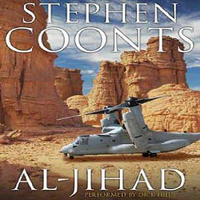FOUR The Camel sat on a granite ridge that humped up out of the desert floor. On the eastern side of the ridge, in the low place scooped out by the wind, there was an oasis, a small pond of muddy water, a few palm trees, and a cluster of mud huts. According to Julie's CIA sister, a few dozen nomads lived here seasonally. Standing on the hood of the Humvee, which was parked on a gentle rise a mile east of the oasis, I could just see the tops of the palms and a few of the huts. No heat source flared up when I switched to infrared.
The old fort was a shattered hulk upon the skyline, brooding and massive. The structure itself wasn't large, but perched there on that granite promontory it was a presence. I slowly did a 360-degree turn, sweeping the desert.
Nothing moved. I saw only rock and hard-packed earth, here and there a scraggly desert plant. The wind had long ago swept away the sand.
Finally I got down off the hood of the Humvee. Julie was standing there with her arms crossed looking cold, although the temperature was at least sixty.
“I want you to drive this thing back into that draw, and just sit and wait. I'm going to walk over there and eyeball it up.” “When are you coming back?” “Couple hours after dawn, probably. I want to make sure there are no people there, and I want to see it in the daylight.” “Can't we just wait until tonight to check it out?” “I'm not going to spend a day not knowing what in hell is over the hill. I didn't get to be this old by taking foolish risks. Drive down there and wait for me.” She got in the Humvee and did as I asked. I adjusted my night-vision goggles, tucked the Model 70 under my arm, and started hiking.
I had decided on South Africa. After this was over, I was going to try South Africa. I figured it would be middling difficult for the Arabs to root me out there. I had never been to South Africa, but from everything I had seen and heard the country sounded like it might have a future now that they had made a start at solving the racial problem. South Africa. My image of the place had a bit of a Wild West flavor that appealed to my sporting instincts.
Not that I really have any sporting instincts. Those all got squeezed out of me in Vietnam. I'd rather shoot the bastards in the back than in the front: It's safer. The CIA and FBI? They could find me anywhere, if they wanted to. The theft of a V-22 wasn't likely to escape their notice, but I didn't think the violent death of some terrorists would inspire those folks to put in a lot of overtime. I figured a fellow who stayed out of sight would soon be out of mind, too.
With three million dollars in my jeans, staying out of sight would be a pleasure.
That's the way I had it figured, anyhow. As I walked across the desert hardpan toward the huts by the mud-hole, I confess, I was thinking again about South Africa, which made me angry.
Concentrate, I told myself. Stay focused. Stay alive.
I was glad the desert here was free of sand. I was leaving no tracks in the hard-packed earth and stone of the desert floor that I could see or feel with my fingers, which relieved me somewhat.
I took my time approaching the huts from downwind. No dogs that I could see, no vehicles, no sign of people. The place looked deserted.
And was. Not a soul around. I checked all five of the huts, looked in the sheds. Not even a goat or puppy.
There were marks of livestock by the water hole. Only six inches of water, I estimated, at the deepest part. At the widest place the pond was perhaps thirty feet across, about the size of an Iowa farm pond but with less water.
The cliff loomed above the back of the water hole. Sure enough, I found a trail. I started climbing.
The top of the ridge was about three hundred feet above the surrounding terrain. I huffed and puffed a bit getting up there. On top there was a little breeze blowing, a warm, dry desert breeze that felt delicious at that hour of the night.
I found a vantage point and examined the fort through the night-vision goggles, looked all around in every direction. To the west I could see the paved strip of the airport reflecting the starlight, so it appeared faintly luminescent. It too was empty. No people, no planes, no vehicles, no movement, just stone and great empty places.
I took off the goggles and turned them off to save the battery, then waited for my eyes to adjust to the darkness. The stars were so close in that clear dry air it seemed as if I could reach up and touch them. To the east the sky was lightening up.
As the dawn slowly chased away the night, I worked my way toward the fort, which was about a third of a mile from where the trail topped the ridge. Fortunately there were head-high clumps of desert brush tucked into the nooks and crannies of the granite, so I tried to stay under cover as much as possible. By the time the sun poked its head over the earth's rim I was standing under the wall of the fort. I listened.
All I could hear was the whisper of the wind.

